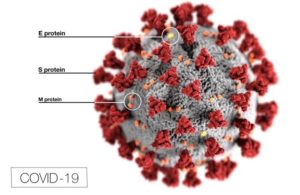April 16, 2020
Richard Pilch
This article is part of World War “V”: The COVID-19 Pandemic, a collection of all CNS COVID-19-related articles.
The following is an excerpt of an interview with Richard Pilch for the Russian Foreign Affairs Council (RIAC)
Interview with Dr. Richard Pilch, Director of the Chemical and Biological Weapons Nonproliferation Program at the James Martin Center for Nonproliferation Studies. Since 9/11 and the “anthrax letter” attacks of 2001, he has focused on national security issues and spent nearly ten years overseas, including Russia, assessing and addressing biological warfare, bioterrorism, and public health emergencies. Dr. Pilch has led many threat reduction programs on behalf of the US government, served on over 30 technical panels and advisory boards. He is the author of over 60 publications and co-editor of the Encyclopedia of Bioterrorism Defense.
What are the prospects for international cooperation in the field of protection against biological weapons and pandemics? In what ways could Russia and the US work together to reduce these threats?
I worked in Moscow starting 2003 and lived in Moscow from 2004 to 2006, working on cooperation in the fight against biological weapons and global health threats like COVID-19. The program was a Russia-US program. I worked with Russian scientists like myself, who were intent on addressing these threats. The program itself started as a nuclear program, but what really made it valuable on the biological side was that it came after 9/11 in the United States and then the “anthrax letters” that were mailed in the United States. And at the time, President Putin and President Bush were very public about their desire in the face of these threats to work together.
So I was sent to Russia and lived in Moscow, but I flew all over the country, I worked with scientists and our cooperation to address these threats was very real. Since that time, things have changed. But my hope is that COVID-19 will reinvigorate that relationship and provide the opportunity for us to work together again. The opportunity is not simply based on transparency and trust, which can be a limiting factor. The opportunity is based on our role as leaders of the global community. And I think that Russia clearly has a leadership role. The United States must take a leadership role. China must take a leadership role. And for at least the three of our countries to be working cooperatively against natural or deliberate biological threats, I think, is one of the real cornerstones for us to prevent another pandemic like COVID-19.
And that cooperation comes on a number of levels. I think that the biggest thing is simply open information sharing. But the second is a technical exchange. And going back to what we used to do in those early years of the 2000s when I lived in Moscow, scientists in Russia were doing great research, we were working with scientists in America doing great research. They were advancing not just the understanding of these diseases but the countermeasures to battle them. Advancing diagnostics, vaccines, therapeutics, and building a global surveillance and detection network that enabled us to quickly identify and address these global health security threats as they emerged. That is what is missing on a global level. And I really hope we can get to it again.
Continue reading at the Russian Foreign Affairs Council
Further questions include:
- Is there a risk that terrorist groups could use the novel coronavirus as a biological weapon?
- What should governments do to prevent this so-called “pandemic terrorism”?
- In your opinion, does social distancing work?
- A man coughed on a supermarket employee and said that he was infected with the coronavirus. Where should one draw a line between ignorance and criminal intent?
- North Korea claims that it does not have cases of coronavirus. Does it sound plausible?
- Could economic implications of COVID-19 pandemic fuel unrest in the Middle East?
See Also
 World War “V”: The COVID-19 Pandemic
World War “V”: The COVID-19 Pandemic
A collection of all CNS COVID-19-related articles
